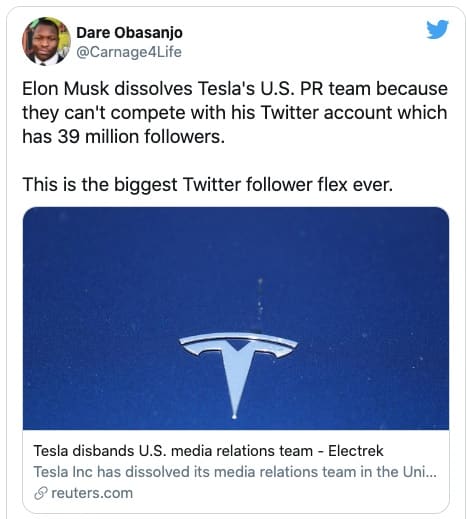I had heard so many whispers of Public Relations firms closing down, dissolved or merged into other marketing or social media or even customer care departments. I wondered when I read the news that Tesla had closed their PR Department, whether Public Relations as a discipline was truly dead.
This announcement was on a different scale and I wondered, if true, who would manage Crisis Communications when organisations would be faced with one?
I had ‘dropped’ out of Public Relations a long time ago, being the restless soul and ventured into other communications discipline of advertising & promotions, branding, customer care and eventually call centre.
In the last two disciplines, I had immersed myself with Social Media as a means to manage the conversation and avoid it from spinning into a reputational crisis. This outcome seems to accompany angry and upset customers, efficient in gathering support, gaining traction and influencing the wide web-world, to arm-twist you to surrender to their demands.
I had not given a thought to Public Relations, until this headline struck me, “Tesla Dissolves its PR Department – A New First In The Industry”.

I truly wondered whether this could be true? Is PR really dead? And if it was, what has been born in its stead? How and Who would then would be tasked to manage the communications of an organization during a crisis situation?
In his published article, “Trust Me, PR Is Dead” by Robert Phillips, he firmly states that, “Public Relations was the brainchild of Sigmund Freud’s nephew, Edward Bernays, created as a means of control over the masses, whose democratic judgement he did not trust.”
He further expounds on the fact that it only became popular, as it was used to create political propaganda and its’ spin-off – corporate social responsibility, were both used to “manage and control” the masses via crafted message management.

In today’s’ internet and social media world – he further urges that we, “…must place radical honesty, radical transparency and actions, not words, at its core…and to build a new, creative model afresh for the world as it is now, not the world as it once was.
The Public Relations Society of America believes that Tesla’s move, “…sets an extraordinarily dangerous precedent for blocking the continued free flow of information…as well as impacting the media’s ability to responsibly cover an organization’s activities.” Other organizations may not fare as well to follow suit. Ted Kitterman of PR Daily, summarised lessons that we could take from Tesla’s dramatic move as follows:
- Owned media channels offer brands power.
- Looking at both Elon Musk and Tesla’s followers, it may suggest that creating a direct connection to the audience is better?
- Elon Musk has 39.1 million followers on Twitter and Tesla, 6.3 million followers.
- Tesla’s direct connection to its followers and fans through social media, with an unwavering devotion to the brand – that impartial and objective media brands (and PR professionals) could never replicate.
- PR practitioners must do more than write press releases.
- PR practitioners should re-skill or up-skill to become experts in the evolving communications needs so as to be indispensable and become knowledgeable communication experts – especially for innovative companies
- Tesla’s Investor relations department are still intact and two of their management personnel was transferred to external relations & employee experience and another, as a content lead for the Design Studio at Tesla, both in February.
- Trust comes at a premium.
- PR practitioners provide good media relationships, offers journalists real value
So does this mean that Social Media Content Management, is the ‘new’ playing field, replacing Public Relations and Media Channels? Will this be the way, moving forward to manage communications in a crisis?
It’s been reported that traditional news channels are probably only getting 30% of the revenue they used to enjoy as EVERYONE can become a content generator and publish ‘news’. A short video on YouTube or TikTok for an ‘influencer’ can now regularly garner more viewers than a prime-time slot on TV.
So who will succeed in this new environment of ‘reporting’ and how can we ensure the corporations messaging, especially during a crisis, gets through?
Nathan Miller, Forbes Council Member and Adele Gambardella-Cehrs CEO & Founder at When and How Agency and Crisis Communications Expert, gave their opinion on what corporations can do to manage their future of communications.
- Deploy Integrated Strategies
- This has been a common practice since traditional communications existed and needs to be continuously embraced, even more so now.
- Companies not utilising listening tools will be at a disadvantage as they would not be able to ensure that the brand can stay relevant and react fast to arising issues
- Tell A Story
- The art of story-telling was diminishing until the advent of Social Media
- Nowadays, telling a compelling story, that touches your audience heart and creating extensive word-of-mouth (or shares) – is the new black!
- Be Nimble and Pro-Active
- In an era where your story can be rewritten, faked, turned into parodies, memes or viral by Twitter mobs, blogged by an influencer, understanding what it means (positive and negative impact) and how to best manage it, across platforms, will be invaluable
- Timing is everything – latch on trending issues to promote your brand and tell your story positively. For example, latching on the ‘Black Lives Matter’ movement for Nike
- Truly Measure Value and Impact (across ALL channels)
- Listening tools can measure more than just likes and dislikes, but also key positive messages or damage to the brand, both in the immediate and long-term
- Perfect Isn’t Possible, To Err Is Human
- Although we will always plan and create stories or messages that will portray us in the best light, there is no way to predict the audience myriad ways to react to it and spin a negative response!
- At best, we strive to manage any negativity, before it becomes a full-blown crisis
- Knowing how to laugh at your brand and at yourself, can be endearing – for example, the FCK campaign example when KFC UK restaurants, ran out of chicken due to a delivery slip-up
So perhaps, Public Relations has just evolved into something bigger, more intangible and requires different flexibility. In a world where everything is in a short text that is snappy, simplified and quick – wouldn’t the best storytellers become PR professionals?
So is PR Dead? Or has it actually been Re-Born, disguised as Social and Story-telling?
Sources and References:
- Trust Me, PR Is Dead, by Robert Phillips
- Why Public Relations (As We Know It) Is Dead by Nathan Miller, Forbes Councils Member
- Why PR is Dead. And, Called Something Else, by Adele Gambardella-Cehrs, CEO & Founder at When and How Agency and Crisis Communications Expert
- What Tesla’s Move To Eliminate Its PR Department Means For The Industry, By Ted Kitterman
Volatile Economic Uncertainties
Anneliza Zainal has been a communications practitioner in the corporates for more than 25 years before becoming a consultant, specialising in crisis communications and customer care. Apart from a Bachelor of Education, Teaching of English as a Second Language (TESL), she is also an accredited NLP Practitioner (ABNLP), Time Line Therapy® Practitioner, Master Class Educator (BKI) & certified HRDF Trainer. Follow her on Linkedin.



















